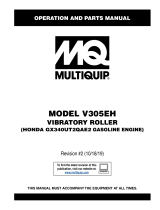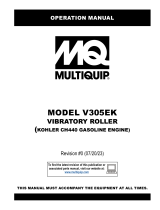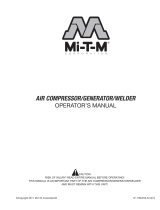
wc_si000247gb.fm
10
Safety Information RD 27
1.2 Machine Description and Intended Use
This machine is a dual drum, ride-on roller. The Wacker Neuson Ride-On Roller
consists of an articulated frame onto which is mounted a gasoline or diesel engine,
a fuel tank, a hydraulic tank, a water tank, a hydrostatic drive system, two steel
drums containing internal eccentric weights, and an operator’s platform with a
ROPS (Roll Over Protective Structure). The engine powers the hydraulic systems
that provide machine movement and drum vibration. The vibrating drums smooth
and compact the work surface as the machine moves. Machine speed, direction,
and vibration are controlled by the operator from the operator’s seat on the
platform.
The machine is designed as a lightweight roller to be used in the compaction of
sublayers and finish layers of asphalt on roads, driveways, parking lots, and other
types of asphalt-covered surfaces.
This machine has been designed and built strictly for the intended use described
above. Using the machine for any other purpose could permanently damage the
machine or seriously injure the operator or other persons in the area. Machine
damage caused by misuse is not covered under warranty.
The following are some examples of misuse:
Using the machine as a ladder, support, or work surface
Using the machine to carry or transport passengers or equipment
Using the machine to tow other machines
Using the machine to spray liquids other than water (i.e., diesel fuel on asphalt)
Operating the machine outside of factory specifications.
Operating the machine in a manner inconsistent with all warnings found on the
machine and in the Operator’s Manual.
This machine has been designed and built in accordance with the latest global
safety standards. It has been carefully engineered to eliminate hazards as far as
practicable and to increase operator safety through protective guards and labeling.
However, some risks may remain even after protective measures have been taken.
They are called residual risks. On this machine, they may include exposure to:
Heat, noise, exhaust, and carbon monoxide from the engine
Burns from hot hydraulic fluid
Fire hazards from improper refueling techniques
Fuel and its fumes
Personal injury from improper lifting techniques
Crushing hazards from improper operation (feet, legs, or arms extending
outside of the operator work station) and for other persons in the work zone
Line of sight blockage by the ROPS
To protect yourself and others, make sure you thoroughly read and understand the
safety information presented in this manual before operating the machine.
























